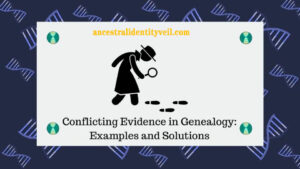What can you do when confronted with contradicting evidence in genealogy research? In this post, find examples and solutions on how to proceed when facts don’t seem to line up properly with each other.

Conflicting Evidence mes Two instances when we find evidence which appears to refer to our ancestor but may not actually do are when there appears to be information which contradicts each other and when two records that correspond to our ancestor but have different facts.
Evidence should be considered when researching our ancestors, so this includes genealogy records, family stories and oral histories. While we shouldn’t rely on other people’s family tree research completely as evidence against ourselves, sometimes using it as clues. Some might view other’s research efforts as part of their evidence pool as well.
Evidence May Not Relate to Ancestor One of the main sources of conflicting evidence can come from records that may not apply directly to our ancestors; for instance if more than one aspect doesn’t match up with what we know already about them then perhaps they relate to someone else instead.
As an example, I wanted to highlight one of my 4th great-grandfathers, William B Thompson. Every census record listed his birth as occurring either between 1814-1815 in Rhode Island.
The estimated birth dates seen for each decade between 1850-1880 on the US Federal Census are often off, due to when people were asked their ages. It’s easy enough to explain.
As I had been stumped on finding my Thompson ancestor, I turned to Ancestry public member trees in search of any clues to his or her origins.
Unbelievably, research by several different individuals has determined that William B Thompson died in Tewksbury, Massachusetts in 1884. On his death record he is listed as having been born in Rhode Island in 1811.
Two major factors make me skeptical that this record belongs to my ancestor: 1) its date of birth is several years off (not just 1 or 2) and 2) I don’t have evidence he lived in Massachusetts at any point during his life – city directories, state census data and vital records all show W. B. Thompson living near his birthplace – Rhode Island
Furthermore, after his death his widow lived with their daughter in Rhode Island – so the record doesn’t feel right to me, even though everyone seems to agree on it – perhaps due to its tempting listing of parents?
Two Records Show Conflicting Information
Another common scenario arises when two records containing our ancestor appear to contain different details – anything from spelling changes to listing different parents can have significant impacts on their data.
There may be multiple causes for details to differ between two records; oftentimes this is caused by incomplete knowledge on behalf of those providing their information to record keepers.
An incorrect date on a census form could occur because someone answering the door didn’t know their exact birthday and therefore estimated.
Mismatch between birth and death certificates could be caused by two individuals providing information at different times; perhaps when providing details for birth records but later providing details for death records.
An oral history interview conducted with a relative may recall information which doesn’t match up with your research findings.
Vital records contain errors that might come as a shock; often through simply human error. My birth certificate listed my father’s place of birth incorrectly, something which only became evident once I requested the long form certificate from the state.
Accuracy in Family Tree Research
Everyone understands the significance of being accurate when conducting family tree research. Every time we create or publish incorrect family trees or histories, real facts become more difficult to uncover.
Family tree researchers should strive for truth and not be led astray by conflicting information. When faced with contradictory data, many researchers can be tempted to simply select whatever fact suits them personally best or makes the most sense; what we should really be after here is not our preferred outcome but the one which will allow us to achieve it more quickly.
No matter if the mistake was intentional or due to genealogy fraud – which, shockingly, exists – its effects are profound for everyone else involved. Family tree researchers invest both their time and often even money in finding out more about our ancestors.
So what should be the response when confronted with conflicting information? Reaching out to those responsible may provide some relief, like correcting an inaccurate tree; but will this really provide any tangible gains?
How Can You Deal with Conflicting Evidence in Genealogy
When researching genealogy, finding contradicting evidence can be frustrating and bewildering. But there are steps we can take to process, analyze and interpret this conflicting information effectively.
As soon as there is any disparate data in genealogy records, we must approach it with an open mind. When there are discrepancies between records, we need to be open to all possibilities in order to discover which solution best fits.
If we come into a search with preconceived notions about what we want to find, it could lead to us missing key pieces of information that could prove crucial in solving mysteries. When conflicting data doesn’t fit with what was expected, ignoring it may mean forgoing the chance of solving an enigma altogether.
As such, I remain cautious to completely dismiss the Massachusetts death record that allegedly belongs to Mr. Thompson that I mentioned at the beginning of this article. Could my expectations prevent me from considering it further?
Leave a Reply